
The Confederate States of America (CSA), commonly referred to as the Confederate States (C.S.), the Confederacy, or the South, was an unrecognized breakaway republic in the Southern United States that existed from February 8, 1861, to May 9, 1865. The Confederacy comprised eleven U.S. states that declared secession and warred against the United States during the American Civil War. The states were South Carolina, Mississippi, Florida, Alabama, Georgia, Louisiana, Texas, Virginia, Arkansas, Tennessee, and North Carolina.

Washington is the county seat of Wilkes County, Georgia, United States. Under its original name, Heard's Fort, it was for a brief time during the American Revolutionary War the Georgia state capital. It is noteworthy as the place where the Confederacy voted to dissolve itself, effectively ending the American Civil War.
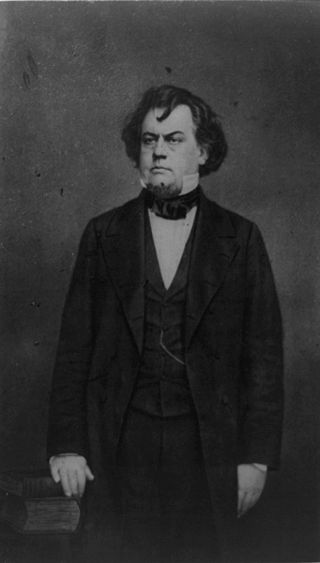
Robert Augustus Toombs was an American politician from Georgia, who was an important figure in the formation of the Confederacy. From a privileged background as a wealthy planter and slaveholder, Toombs embarked on a political career marked by effective oratory, although he also acquired a reputation for hard living, disheveled appearance, and irascibility. He was identified with Alexander H. Stephens's libertarian wing of secessionist opinion, and in contradiction to the nationalist Jefferson Davis, Toombs believed a Civil War to be neither inevitable or winnable by the South.

The Confederate States Army, also called the Confederate Army or the Southern Army, was the military land force of the Confederate States of America during the American Civil War (1861–1865), fighting against the United States forces to win the independence of the Southern states and uphold and expand the institution of slavery. On February 28, 1861, the Provisional Confederate Congress established a provisional volunteer army and gave control over military operations and authority for mustering state forces and volunteers to the newly chosen Confederate president, Jefferson Davis. Davis was a graduate of the U.S. Military Academy, and colonel of a volunteer regiment during the Mexican–American War. He had also been a United States senator from Mississippi and U.S. Secretary of War under President Franklin Pierce. On March 1, 1861, on behalf of the Confederate government, Davis assumed control of the military situation at Charleston, South Carolina, where South Carolina state militia besieged Fort Sumter in Charleston harbor, held by a small U.S. Army garrison. By March 1861, the Provisional Confederate Congress expanded the provisional forces and established a more permanent Confederate States Army.

Alexander Hamilton Stephens was an American politician who served as the first and only vice president of the Confederate States from 1861 to 1865, and later as the 50th governor of Georgia from 1882 until his death in 1883. A member of the Democratic Party, he represented the state of Georgia in the United States House of Representatives before and after the Civil War.
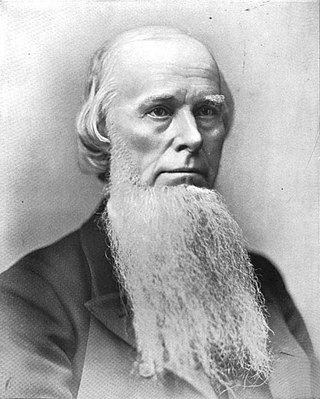
Joseph Emerson Brown, often referred to as Joe Brown, was an American attorney and politician, serving as the 42nd Governor of Georgia from 1857 to 1865, the only governor to serve four terms. He also served as a United States Senator from that state from 1880 to 1891.

Howell Cobb was an American and later Confederate political figure. A southern Democrat, Cobb was a five-term member of the United States House of Representatives and the speaker of the House from 1849 to 1851. He also served as the 40th governor of Georgia (1851–1853) and as a secretary of the treasury under President James Buchanan (1857–1860).
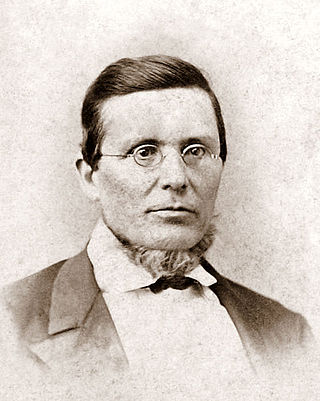
Thomas Hill Watts Sr. was the 18th Governor of the U.S. state of Alabama from 1863 to 1865, during the Civil War.

The Andersonville National Historic Site, located near Andersonville, Georgia, preserves the former Andersonville Prison, a Confederate prisoner-of-war camp during the final fourteen months of the American Civil War. Most of the site lies in southwestern Macon County, adjacent to the east side of the town of Andersonville. The site also contains the Andersonville National Cemetery and the National Prisoner of War Museum. The prison was created in February 1864 and served until April 1865.
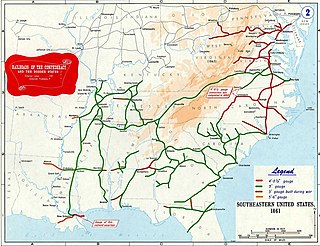
The American Civil War was the first conflict where large armies heavily relied on railroads for transporting supplies. The Confederate States Army's railroad system was fragile and primarily designed for short hauls of cotton to nearby rivers or ocean port. Due to the South's limited manufacturing and industrial capacity, obtaining new parts during the war was challenging. Consequently, the railroad system deteriorated due to overuse, lack of maintenance, and systematic destruction by Union raiders.
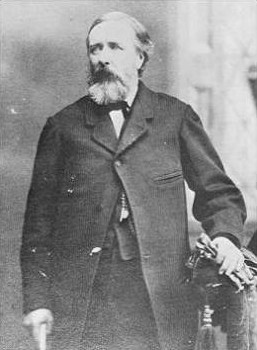
William Montague Browne was a prominent Confederate politician and American newsman. During the American Civil War, he served as Acting Secretary of State for the Confederacy in 1862 and as a temporary brigadier general in the Confederate States Army. When he was not confirmed to that rank by the Confederate Senate, he reverted to his permanent grade of colonel.

Joseph Rogers Underwood was a lawyer, judge, United States Representative and Senator from Kentucky.

Mississippi was the second southern state to declare its secession from the United States, doing so on January 9, 1861. It joined with six other southern states to form the Confederacy on February 4, 1861. Mississippi's location along the lengthy Mississippi River made it strategically important to both the Union and the Confederacy; dozens of battles were fought in the state as armies repeatedly clashed near key towns and transportation nodes.

Georgia was one of the original seven slave states that formed the Confederate States of America in February 1861, triggering the U.S. Civil War. The state governor, Democrat Joseph E. Brown, wanted locally raised troops to be used only for the defence of Georgia, in defiance of Confederate president Jefferson Davis, who wanted to deploy them on other battlefronts. When the Union blockade prevented Georgia from exporting its plentiful cotton in exchange for key imports, Brown ordered farmers to grow food instead, but the breakdown of transport systems led to desperate shortages.
The bibliography of the American Civil War comprises books that deal in large part with the American Civil War. There are over 60,000 books on the war, with more appearing each month. Authors James Lincoln Collier and Christopher Collier stated in 2012, "No event in American history has been so thoroughly studied, not merely by historians, but by tens of thousands of other Americans who have made the war their hobby. Perhaps a hundred thousand books have been published about the Civil War."

William Charles "Jack" Davis is an American historian who was a professor of history at Virginia Tech and the former director of programs at that school's Virginia Center for Civil War Studies. Specializing in the American Civil War, Davis has written more than 40 books on that subject and other aspects of early southern U.S. history, such as the Texas Revolution. He is the only three-time winner of the Jefferson Davis Prize for Confederate history and was awarded the Jules and Frances Landry Award for Southern History. His book Lone Star Rising has been called "the best one-volume history of the Texas revolution yet written".
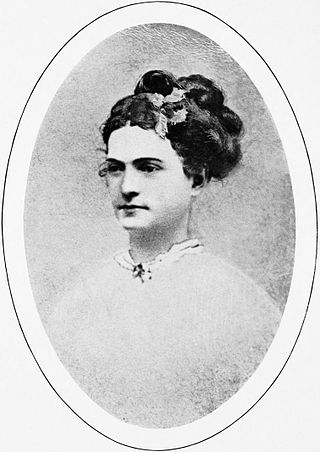
Eliza Frances Andrews was a popular American writer of the Gilded Age. Her shorter works were published in popular magazines and papers, including the New York World and Godey's Lady's Book. Her longer works include The War-Time Journal of a Georgia Girl (1908) and two botany textbooks.
The Battle of Columbus, Georgia, was the last conflict in the Union campaign through Alabama and Georgia, known as Wilson's Raid, in the final full month of the American Civil War.

Between 1861 and 1865, American Civil War prison camps were operated by the Union and the Confederacy to detain over 400,000 captured soldiers. From the start of the Civil War through to 1863 a parole exchange system saw most prisoners of war swapped relatively quickly. However, from 1863 this broke down following the Confederacy's refusal to treat black and white Union prisoners equally, leading to soaring numbers held on both sides.

















